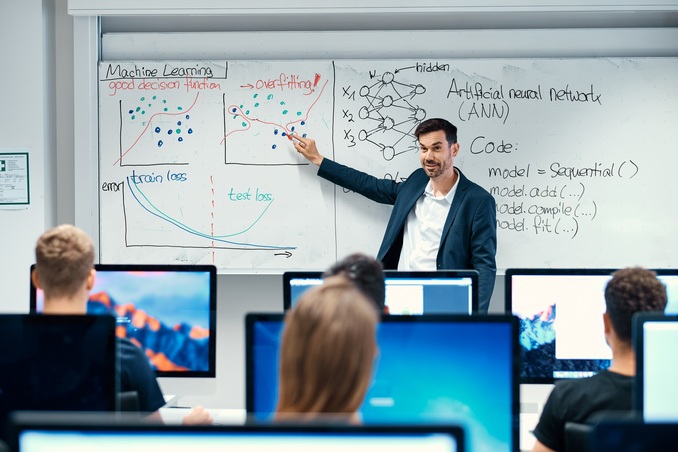Conquering Space with Artificial IntelligenceAalen University’s computer scientists successfully competed in a contest from the European Space Agency

A team of Aalen University’s computer scientists directed by Prof. Dr. Andreas Theissler achieved fourth place in the data challenge for the ARIEL space mission. Photo Credits: © Jan Walford | Aalen University
How can we discover foreign planets and learn something about them without even flying into space? To answer this question, Aalen University’s scientists applied the principles of machine learning, which is part of artificial intelligence. A team of computer scientists successfully competed in a competition from the Consortium of the European Space Agency (ESA) for the upcoming space mission ARIEL (Atmospheric Remote-sensing Infrared Explanet Large-survey), which will research outer space, as well discover and observe planets outside of our solar system.
When we look to the starry skies on a clear night, we see numerous celestial bodies. The majority of these are stars unthinkably far away. While planets are also visible some nights, it takes sophisticated techniques to view planets outside of our solar system, which are known as exoplanets. A common practice is to observe the small changes in starlight caused by a planet as it orbits that star.
Even so, the recorded changes are often so miniscule that they can hardly be detected by measuring instruments due to disturbances such as so-called star spots.
Competition for Observing Planets with Artificial Intelligence
Within the framework of the ARIEL space mission, the ESA will send a telescope into space to observe around 1,000 exoplanets and collect comprehensive photometric data materials. To prepare for this mission, an international conference hosted a competition under the name “Machine vs. Stellar and Instrument Noise.” The techniques of machine learning should help detect the changes in starlight in various wavelengths. This method should help inference the attributes of planets – without even having seen them once. Machine learning techniques learn correlations and patterns with the help of example data and have the ability to generalize, which makes it possible to analyze new data. The question now is whether this characteristic can also be applied to the measurements of exoplanets.
A team from Aalen University recently took on this challenge and successfully participated in the competition. The team, consisting of Prof. Dr. Andreas Theissler and Sven Ebert and Jonas Paul, both students in the Business Information Systems, achieved fourth place among over 100 other participants.
Both students agree: “The ARIEL space mission shows how diverse the application fields for machine learning can be.” This competition also influenced their life journeys. While Ebert will apply himself to questions in the field of natural sciences after successfully completing his final thesis, Paul wants to further deepen his knowledge of artificial intelligence and complete the Master Study Program Business Information Systems at Aalen University.
